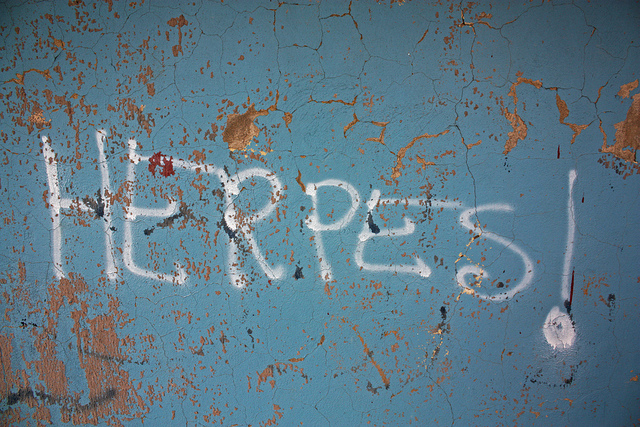Herpes is a common, recurring sexually transmitted disease (STD) caused by a virus called the Herpes Simplex Virus (HSV). There are two kinds of HSV: Herpes Simplex 1 (HS1) and Herpes Simplex 2 (HS2). Usually, HS1 infects the mouth and causes sores called “cold sores” and HS2 infects the genitals. Both types can be transmitted sexually. Although the infection can stay in the body indefinitely, the number of outbreaks tends to decrease over a period of years.
How do I get it? Herpes is transmitted when an infected part of one person’s body touches an uninfected part of another person’s body.Herpes can be transmitted before a sore appears, so you can’t be sure that somebody doesn’t have herpes just by looking.
How can I tell if I have it? Does it hurt? The first sign of herpes is an itchy or tingling feeling. Next, blisters will appear in small clusters on the outside or inside of your vagina, penis, anus or butt, or on your mouth. When the blisters break, they turn into sores, which can be itchy and painful. The sore forms a scab, which heals itself. If you have herpes, it’s important to eat well and exercise because you’re more likely to have an outbreak if you are stressed out, tired, in the sun a lot, or sick. Women are more likely to have an outbreak if they have their period or are pregnant.
How can I avoid it? Some people might not know they have herpes, but they can still pass it on. Using condoms or dental dams when you have sex will lower the risk, but doesn’t make it completely safe, because herpes can affect parts of the skin not covered by condoms.
Herpes is most contagious when one person with the infection has sores, but herpes can also be spread when no sores are visible.
How do I get tested for herpes? Herpes can only be diagnosed when you have an active sore. This means going to the doctor within three days of finding a sore, because it’s difficult to diagnose once a sore heals. To find out where you can go for a sexual health check-up, call your doctor, a local health clinic, or a Planned Parenthood sexual health center.
Is there a cure for herpes? No. Currently there is no cure for the herpes virus, but a doctor can help you manage the symptoms and outbreaks with medication. Each outbreak of sores will heal by itself eventually, but the virus will stay in your body.
Acknowledgement: This fact sheet was originally developed by youth and staff at ReachOut.com, a website that helps teens get through tough times.


